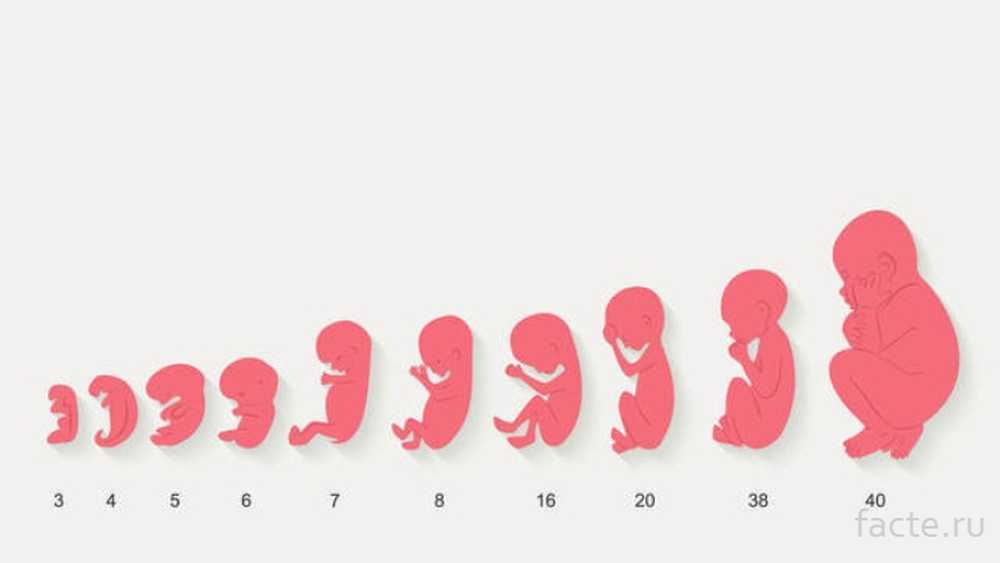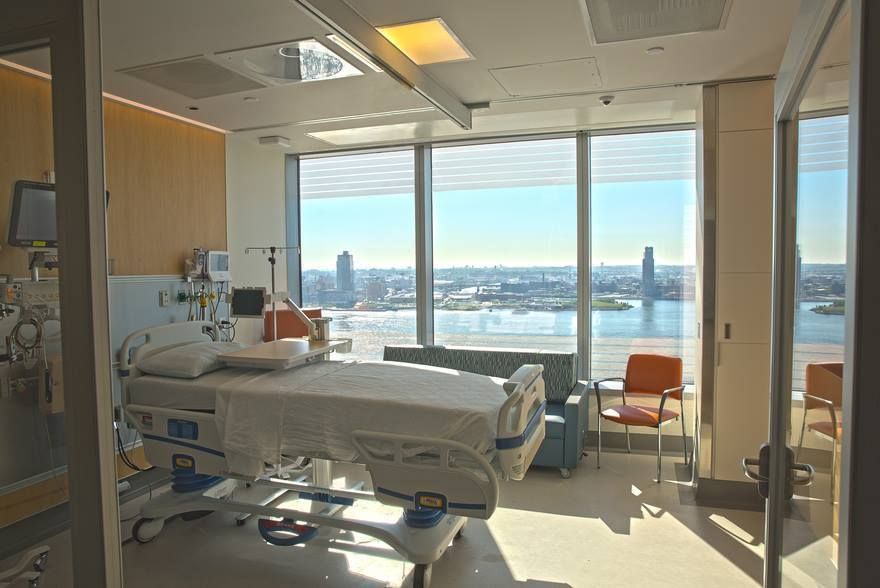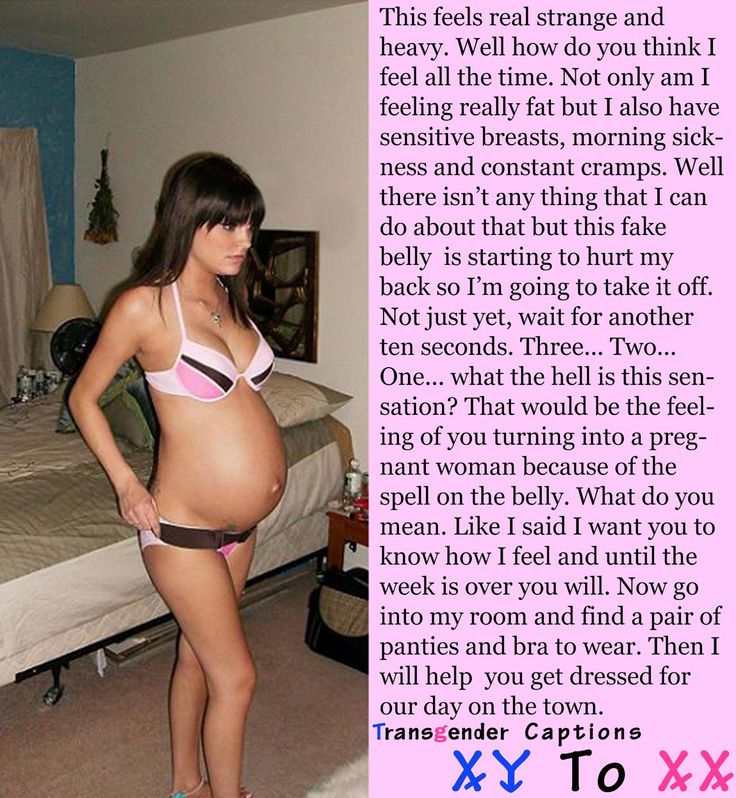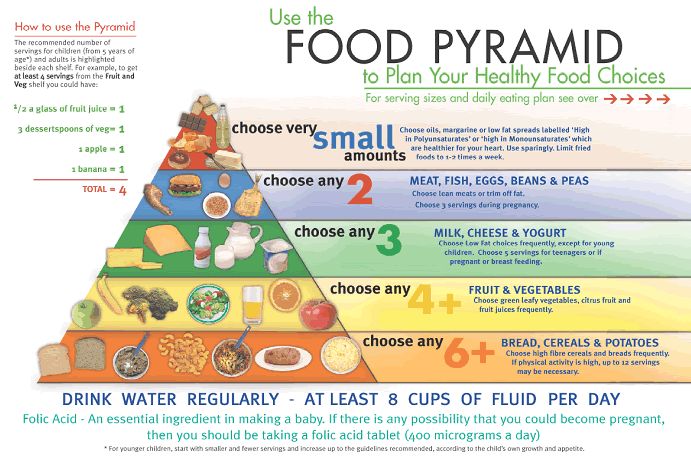Eleventh week of pregnancy
11 Weeks Pregnant | Pregnancy
When you're pregnant, you have lots of questions. Our week-by-week pregnancy guide is packed with lots of useful information. From what's happening inside your body, to how your baby is developing, and tips and advice on having a healthy pregnancy – this is your one-stop pregnancy guide!
- 1st trimester
- 2nd trimester
- 3rd trimester
Our week-by-week pregnancy guide is full of essential information. From early pregnancy symptoms to how your baby is growing and developing, you'll find it all here.
- Week 4
- Week 5
- Week 6
- Week 7
- Week 8
- Week 9
- Week 10
- Week 11
- Week 12
You only have 2 weeks until you start your 2nd trimester. This is when many women start to "glow" and regain their energy as their hormones settle down.
You'll be offered a range of tests around now that will look at your blood, urine and blood pressure. These tests provide an opportunity to have yours and your baby's health checked. You can find out more about antenatal checks and tests on the NHS website.
What's happening in my body?
As you start to bulge out a bit, your muscles and ligaments will stretch, and this could give you pains around your stomach. If it hurts a lot, see your midwife or doctor as soon as possible.
Your body is now pumping around up to 50% more blood than usual. The blood feeds your womb, but it can also make you feel hot, sweaty and dizzy. That's your baby's way of telling you to rest.
Your baby has previously been fed by a yolk sac, but a new organ called the placenta is about to take over. The placenta will nourish the baby and remove waste. While the switchover happens, the hormones involved could make you feel tired and emotional.
What to expect from your first scan
Hospitals in England usually offer 2 ultrasound scans during pregnancy.
The first is a dating scan between 8 and 14 weeks. The sonographer (who takes the test) uses harmless invisible waves to build up a detailed picture of the inside of your womb. The test can include a nuchal translucency test (NT) that measures the fluid at the back of the baby's neck, as part of a screening process for Down's syndrome.
Early pregnancy symptoms (at 11 weeks)
You may be feeling very tired at the moment, but gentle exercise such as walking could help you feel better.
Your early signs of pregnancy could also include:
- aches and pains around your bump
- nausea
- mood swings
- a metallic taste in your mouth
- sore breasts
- indigestion and heartburn
- headaches
- dizziness
- new likes and dislikes for food and drink
- a heightened sense of smell
- a white milky pregnancy discharge from your vagina
- light spotting (see your doctor if you get bleeding in pregnancy)
- cramping, a bit like period pains
- darkened skin on your face or brown patches - this is known as chloasma or the "mask of pregnancy"
- greasier, spotty skin
- thicker and shinier hair
- bloating and the feeling of being bloated (read ways to cope with bloating on week 10's page)
Read Tommy's guide to common pregnancy symptoms.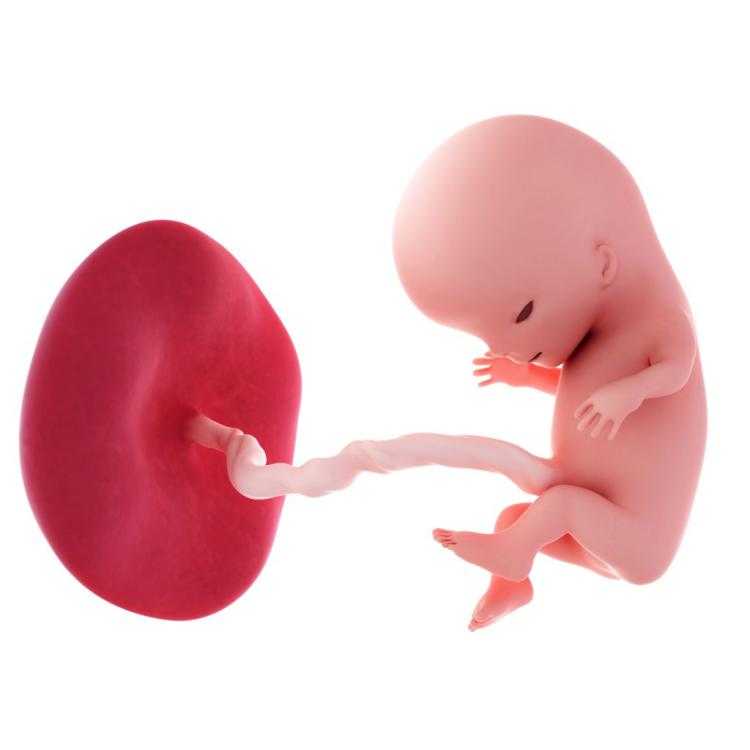
What does my baby look like?
Your baby, or foetus, is now around 41mm long from head to bottom, which is about the size of a fig. The head is still supersized, but the body is growing quickly. The fingers and toes are separating out. There are tiny fingernails and miniature ears. Although your baby is kicking around inside your womb, you probably won't feel anything for several weeks.
Action stations
Start thinking about your birth plan – visit the NHS website for the tips and to download a birth plan template.
It's also a good time to do the following:
Share the news with your GP or ask for an appointment with a midwife at your doctors' surgery. Alternatively you can refer yourself to your local hospital – look for contact details on their website.
You'll need to arrange a booking appointment. This usually takes place between weeks eight and 12 and takes around an hour. You can talk about the options for your pregnancy and the birth.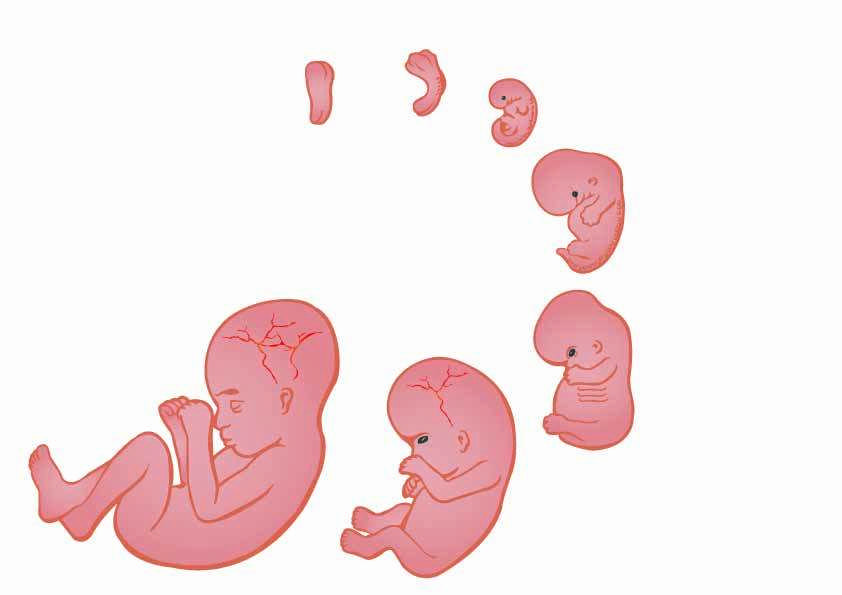 Plus you'll be offered screening tests for infectious diseases, and conditions such as Down's syndrome. You could ask about the Maternity Transformation Programme and how it could benefit you.
Plus you'll be offered screening tests for infectious diseases, and conditions such as Down's syndrome. You could ask about the Maternity Transformation Programme and how it could benefit you.
You will be offered your first dating scan at 8 to 14 weeks.
If it's your first pregnancy, you will probably have around 10 appointments and 2 scans in total.
Ask your midwife or doctor about online antenatal classes – they may be able to recommend one. The charity Tommy's has lots of useful information on antenatal classes and preparing you for birth.
Antenatal classes will give you the chance to meet other people and prepare you for parenthood. The NCT offers online antenatal classes with small groups of people that live locally to you.
Take prenatal vitamins. You're advised to take 400 micrograms of folic acid, every day, until at least week 12. This helps your baby's nervous system to form and offers some protection from conditions such as spina bifida.
To keep bones and muscles healthy, we need vitamin D. From late March/early April to the end of September, most people make enough vitamin D from sunlight on their skin. However, between October and early March, you should consider taking a daily vitamin D supplement because we cannot make enough from sunlight.
From late March/early April to the end of September, most people make enough vitamin D from sunlight on their skin. However, between October and early March, you should consider taking a daily vitamin D supplement because we cannot make enough from sunlight.
Some people should take a vitamin D supplement all year round, find out if this applies to you on the NHS website. You just need 10 micrograms (it's the same for grown-ups and kids). Check if you're entitled to free vitamins.
Do you think you or your partner could have a sexually transmitted infection (STI)? If so, get checked out, as this could affect your baby's development. Talk to your midwife or GP, or visit a sexual health clinic.
It's recommended that you do 150 minutes of exercise a week while pregnant. You could start off with just 10 minutes of daily exercise - perhaps take a brisk walk outside. Check out Sport England's #StayInWorkOut online exercises (scroll to the pregnancy section). Listen to your body and do what feels right for you.
There's no need to eat for two. If you pile on the pounds, you could put you and your baby at risk of health problems such as high blood pressure. Eat healthily, with plenty of fresh fruit and veg, and avoid processed, fatty and salty foods. You may be able to get free milk, fruit and veg through the Healthy Start scheme.
If you have a long term health condition, then let your specialist or GP know that you're pregnant as soon as possible. Don't stop taking any regular medication without discussing it first with your doctor.
How are you today? If you're feeling anxious or low, then talk to your midwife or doctor who can point you in the right direction to get all the support you need. You could also discuss your worries with your partner, friends and family.
You may be worried about your relationship, or money, or having somewhere permanent to live. Don't keep it to yourself. It's important to ask for help if you need it.
You and your family should follow the government and NHS guidance on coronavirus (COVID-19):
To find out about about COVID-19 and pregnancy, childbirth and breastfeeding, have a look at advice on the:
Want to know when the baby's due?
Use the NHS pregnancy due date calculator.
You'll get a more accurate date from your doctor or midwife when you have a dating scan (usually at eight to 14 weeks).
Go back to week 10
Go to week 12
Baby and You at 11 Weeks Pregnant: Symptoms and Development
In this article:
Key takeaways at week 11
Baby's development at week 11
3D anatomy views
Pregnancy symptoms this week
Your body at 11 weeks
Tips for week 11
Checklist for week 11
Key Takeaways at 11 Weeks Pregnant
- Between now and week 14, you’ll have the first trimester screen; this consists of a nuchal translucency screening (NTS) via ultrasound (this looks at the thickness of the back of baby's neck) and a blood test. Together, the results can determine baby’s risk for certain chromosomal abnormalities or conditions.
- You may have a teeny baby bump at this point—or your clothes might start feeling a bit tight. Either way, you won’t be able to get away with your regular jeans for much longer.
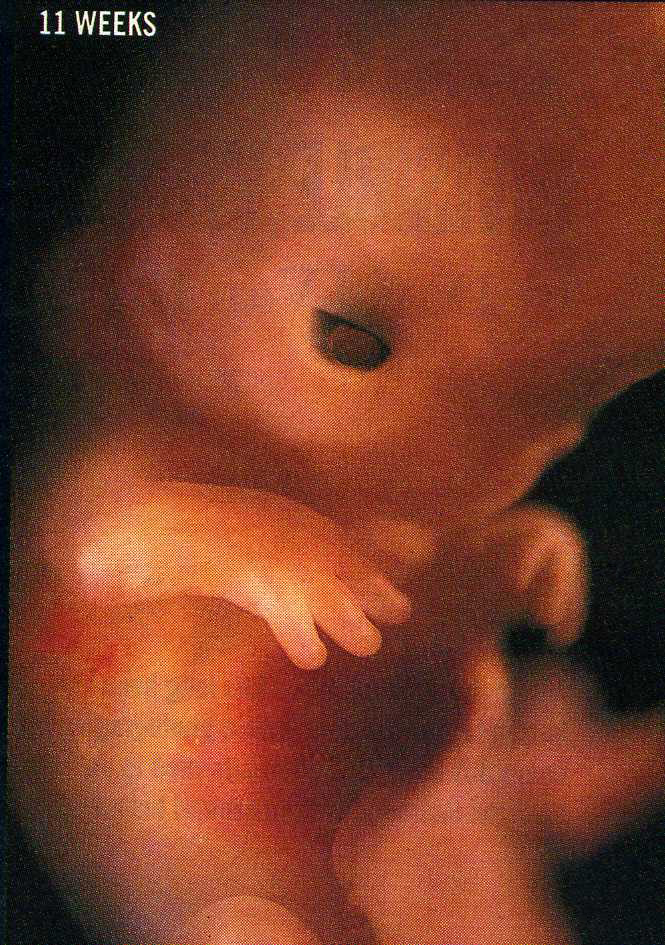
- You’re in the thick of the first trimester and those pregnancy symptoms are still strong, thanks to all that hCG flooding through your system. Sore breasts, morning sickness and out-of-control exhaustion are just a few things you might be experiencing. Rest assured that these unpleasantries should improve in a few short weeks as you approach the second trimester.
Pregnancy week 11 is a great time to start planning a babymoon with your partner. We recommend you go on this trip in the second trimester, since that’s when you’ll feel most energized, and we doubt you’ll want to do a lot of traveling once you hit the third trimester. So at 11 weeks pregnant, take your mind off your queasiness and start scouting some destinations now. (Staycations totally count!) If you need another diversion, imagine your growing baby at 11 weeks, doing just fine in there, becoming more developed every day.
Watch Week 11 Highlights
Baby at Week 11
You can't see it, but baby is moving fluidly and gracefully inside your 11 weeks pregnant belly.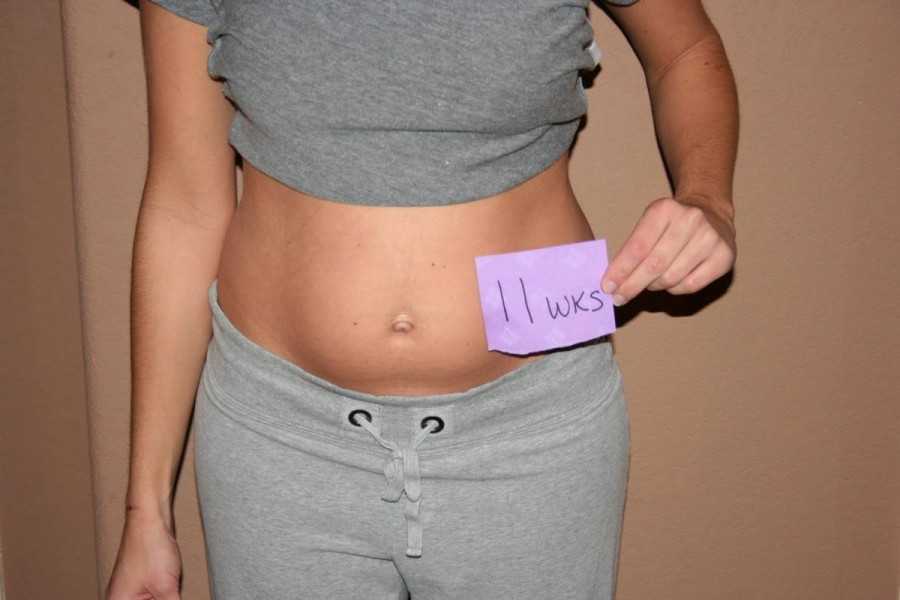 Your 11-week fetus has skin that’s see-through but is on its way to becoming more opaque. At 11 weeks, baby's fingers and toes aren't webbed anymore. Tooth buds, hair follicles and nail beds are forming too. Cool, huh?!
Your 11-week fetus has skin that’s see-through but is on its way to becoming more opaque. At 11 weeks, baby's fingers and toes aren't webbed anymore. Tooth buds, hair follicles and nail beds are forming too. Cool, huh?!
How big is baby at 11 weeks?
Baby is now as big as a lime! Your 11-week fetus is about 1.6 inches long and weighs in at about .25 ounces. They’ve got about a 1:1 head-to-body ratio. (It may sound weird, but that will change!)
11 weeks pregnant is how many months?
Pregnancy lasts 40 weeks, so doctors tend to track your progress by weeks, not months. But if you really want to know, at 11 weeks you're about two months and three weeks pregnant. In three more weeks, you’ll begin the second trimester.
11 week ultrasound
Right around now—between weeks 11 and 14—you may be getting a first trimester screen. This is a combo of a special ultrasound called a Nuchal Translucency Screening (NTS) and a blood test. During the 11 weeks pregnant ultrasound, the technician or doctor will measure the back of baby’s neck.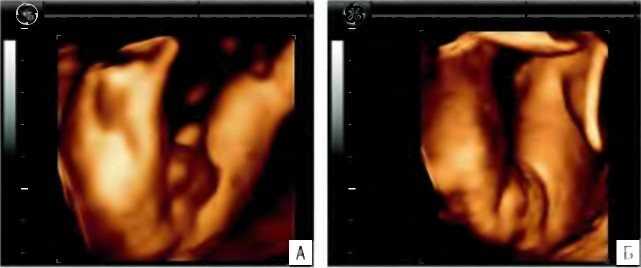 An abnormal measurement could be a sign of a chromosomal abnormality. Then the blood test will screen for too-low or too-high hormone levels. Taking into account the results of both the NTS and the blood test, your doctor will tell you baby’s risk of having certain chromosomal conditions. Waiting for the results may be nerve-wracking, but knowing the results will likely give you peace of mind.
An abnormal measurement could be a sign of a chromosomal abnormality. Then the blood test will screen for too-low or too-high hormone levels. Taking into account the results of both the NTS and the blood test, your doctor will tell you baby’s risk of having certain chromosomal conditions. Waiting for the results may be nerve-wracking, but knowing the results will likely give you peace of mind.
For women who are 11 weeks pregnant with twins, an ultrasound at this point would show the babies’ umbilical cords and either one placenta or two. If the babies share a placenta, the fetuses are probably identical twins. If they have two separate placentas, they may be identical or fraternal. Identical twins sharing the same placenta usually need more frequent check-ups to be sure they’re both getting enough nutrition. Yep, even in utero these siblings already have to learn to share!
3D Views: My Baby, My Body
See their progress for yourself with our 3D interactive tool.
See My Baby in 3D
See My Body in 3D
ADVERTISEMENT
Pregnancy Symptoms at Week 11
Around 11 weeks, your body (and mind!) are still completely haywire. It’s probably tough to feel calm right now, since your hormones are still raging and you may still be feeling pretty nauseous. But know there’s light at the end of the tunnel—just a few more weeks left in the first trimester, which is notoriously the worst for pregnancy symptoms! Here’s more about what you’re likely feeling at 11 weeks pregnant:
It’s probably tough to feel calm right now, since your hormones are still raging and you may still be feeling pretty nauseous. But know there’s light at the end of the tunnel—just a few more weeks left in the first trimester, which is notoriously the worst for pregnancy symptoms! Here’s more about what you’re likely feeling at 11 weeks pregnant:
Fatigue
You’re beat, but you can expect a surge in your energy in trimester two. Until then, give yourself permission to kick back and get some extra rest.
Nausea
We get it. You’re sick and tired of being sick and tired. We promise you should start to feel more like yourself soon.
Gas
Sorry, but tummy troubles are par for the pregnancy course. If you’re experiencing uncomfortable rumblings and bubblings, keep a close eye on your diet (if you’re able to hold anything down, that is) and try to avoid foods that make you gassy, such as beans, cabbage, fried foods and desserts. Drink lots of liquids and eat fiber-rich foods too.
Mood swings
Are you feeling up one minute, then down the next? Mood swings are completely natural thanks to the hormones swirling through your body. Try some mind/body exercises, like yoga, to help you feel more Zen. And if possible, avoid stressful situations. If the mood swings seem drastic, or you have a history of mental health issues such as depression or anxiety, it helps to check in with your doctor.
Leg cramps
Tight, painful muscles can strike at night and interfere with your sleep. Drinking plenty of water can prevent leg cramps, and so can stretching your legs during the day. You also want to take a look at your diet to be sure you’re getting enough potassium and magnesium.
Skin darkening
One morning you might wake and think, “whoa! What’s that dark line down the center of my belly and why is it there?” Well, this is a totally normal pregnancy symptom called the linea nigra. This dark line is caused by hormonal changes and isn’t usually permanent, though you might notice that it sticks around for a while after you give birth, especially if you breastfeed (because of the hormones involved with nursing).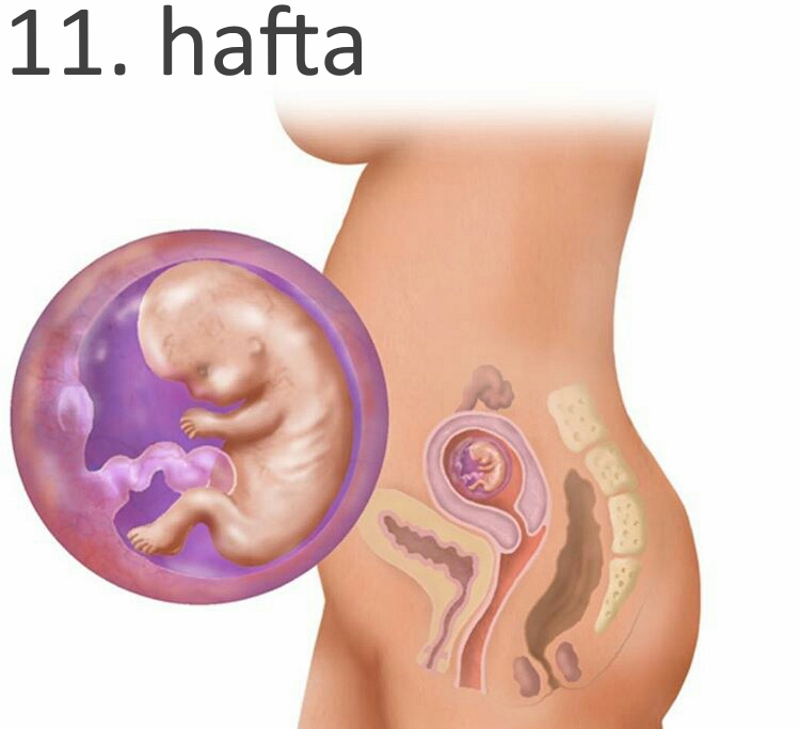
Vaginal discharge
Okay, so you’re probably going to want to invest in some pantiliners, because an increase in discharge can be expected throughout your pregnancy. This 11 weeks pregnant symptom is your body’s way of eliminating secretions from the vagina and cervix.
Women who are 11 weeks pregnant with twins often have elevated hormone levels, which may mean double the symptoms and higher weight gain. Both are normal, and you’ll likely experience increased energy and decreased nausea in the coming weeks.
What you might feel like at 11 weeks pregnant
Wondering what you should feel like at 11 weeks pregnant? You’ve probably got some of those 11 week pregnant symptoms we mentioned, as well as general aches and pains as your body is undergoing so many changes. On the plus side, you may be noticing that your hair and nails are starting to grow. Above all, continue to listen to your body and rest when you need to.
Your Pregnant Belly at 11 Weeks
Is that a baby bump or gas and bloating? At 11 weeks pregnant, it can be hard to tell! Especially if it’s your first pregnancy, you might not be showing at 11 weeks. Women pregnant with their second babies and those who are 11 weeks pregnant with twins tend to start showing earlier than first-time moms-to-be.
Women pregnant with their second babies and those who are 11 weeks pregnant with twins tend to start showing earlier than first-time moms-to-be.
While your belly may or may not be visibly changing, you may be surprised to see your breasts have noticeably changed (which may be welcome or unwelcome, depending on your preference!). We recommend you shop for some new, comfy, stretchy bras at this stage in the game. If you’re planning on breastfeeding, a nursing bra can be worn now and will come in handy after baby’s born. Plus, nursing bras are normally made to keep up with a changing bust size, and you probably have some more growing to do.
With an 11-week fetus, the chance of miscarriage might be on your mind. It’s tough not to worry—welcome to motherhood!—but now that you’ve seen baby’s heartbeat, your miscarriage risk has significantly dropped, and once you hit your second trimester, the risk will be less than 1 percent.
Can I have a baby bump at 11 weeks pregnant?
Definitely! Every woman’s body is different, and a bump can start popping out when baby’s at 11 weeks (especially if you’re carrying multiples or have been pregnant before). In some cases, the first sign of a bump may not be a rounded belly but a too-tight feeling in the waistband of your favorite jeans or skirt. Time to shop for maternity clothes!
In some cases, the first sign of a bump may not be a rounded belly but a too-tight feeling in the waistband of your favorite jeans or skirt. Time to shop for maternity clothes!
Can you feel baby move at 11 weeks?
Was that a kick you just felt? You’re probably eager to experience those magical first flutters and wondering, “can you feel baby move at 11 weeks?” At this stage, it’s probably a little too early to feel baby move—that won’t “kick” in until around the second trimester. That’s because your 11-week fetus is still too small, but don’t worry—it will happen soon!
Why choose a midwife? You're looking for someone to hold space for you in your transition to parenthood and walk you through your options for compassionate, personalized, evidence-based care. Midwives will help keep you and your baby safe while making sure you feel cared for and respected.”
Olivia Bennett
MSN, CNM, ARNP, certified nurse midwife and clinical director at Quilted Health
Tips for 11 Weeks Pregnant
Want to take charge of your health and that of your future baby? Here’s what you can do now.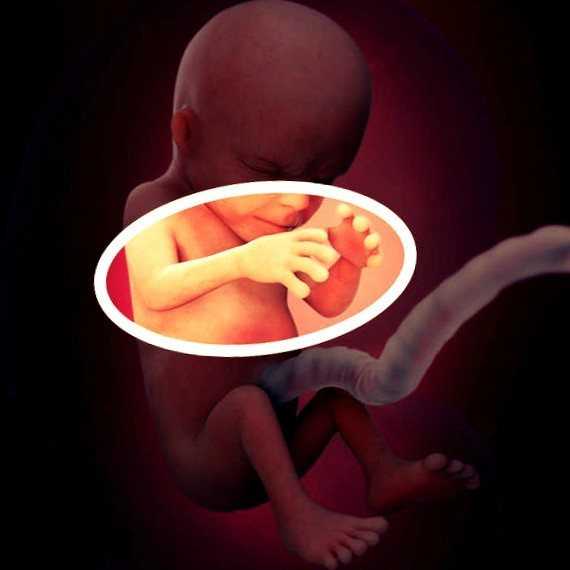
Get lots of calcium
Helping baby grow strong bones and teeth requires about 1,000 milligrams of calcium as part of your daily diet. Dairy products like milk, yogurt and pasteurized cheese are always good choices, but you can also get calcium from other sources like almonds, salmon, tofu and eggs.
Take a walk
Stretch those legs! Walking is one of the best forms of exercise during pregnancy because it’s safe, easy to do, gentle on the joints and a great all-over workout. If you’re new to exercise, walking is also ideal because you can start at your own pace and distance and work up gradually. Plus, all that fresh air and movement may help with nausea! Just make sure to drink plenty of water and avoid walking during the hottest times of the day.
Eat right to avoid heartburn
Gas and nausea during pregnancy are hard enough without throwing heartburn into the mix. You can curb that acid reflux by eating small meals and steering clear of foods that are heavy on spice and fat. And as great as it feels to put your feet up after a meal, try not to lie down right away so your food can properly digest.
And as great as it feels to put your feet up after a meal, try not to lie down right away so your food can properly digest.
Baby your skin
When baby’s at 11 weeks, your skin hasn’t started to expand too much yet, which is why it’s the perfect time to be proactive about stretch marks. There’s no sure-fire way to avoid those stripes (sometimes it’s just a matter of genetics), but moisturizing regularly, drinking plenty of water and eating skin-boosting nutrients like Vitamins C, E, B2, B3 and zinc can help.
Pregnancy Checklist at 11 Weeks Pregnant
Reminders for the week:
save article
PREVIOUS
Week 10Pregnancy
NEXT
Week 12Pregnancy
Get More From
Sign up for weekly updates to help you on the road to parenthood, and enter for a chance to win our $1000 new member sweepstakes!*
Choose Your Journey
Already a member? Log In
*See official rules
Watch These Videos Next:
Advertisement
Article saved. Go to My Saved Articles
Go to My Saved Articles
Article removed.
11 weeks pregnant after conception
Mom and baby at 11 weeks
You are already close to the 2nd trimester, the most calm and pleasant period of pregnancy. 11 obstetric week of pregnancy is an important period. This week, the risks of miscarriage and the development of congenital malformations are significantly reduced, because the main organs of the fetus: the heart, liver, intestines, brain and lungs are already formed. The embryo at the 11th week of pregnancy begins to actively grow.
The proportions of the fetus are getting closer and closer to human proportions - this week its body will double in size, and the head, which is no longer so tightly pressed to the chest, will be half this length. The legs are extended and catch up with the growth of the arms. The baby has already formed a four-chamber heart, which beats at a speed of 140-160 beats per minute. From this time on, the fetal heart rate can be accurately measured with an ultrasound probe.
The baby's muscles are actively developing, he is mastering more and more new movements. Now he can suck, swallow, yawn and even hiccup.
The volume of blood in the body of a pregnant woman continues to increase - because of this, you may be haunted by a feeling of heat and stuffiness, thirsty. Listen to your body - drink plenty of fluids, wear loose clothing, ventilate the room more often.
From weeks 11 to 14 you will have your first screening. This study is aimed at identifying malformations of the neural tube, Down's syndrome and other gross developmental disorders. The study consists of an ultrasound and a mother's blood test for the level of the hCG hormone and the PAPP-A protein. On ultrasound, the doctor examines the baby's physique, the correspondence of its size to the gestational age, checks blood flow and heart function, and also measures the neck crease. The size of the neck fold is one of the parameters that determine the degree of risk of Down syndrome. Screening is absolutely not dangerous for the unborn child and mother. If the results of the screening reveal high risks of developing pathologies, the doctor will refer you for additional examinations.
Screening is absolutely not dangerous for the unborn child and mother. If the results of the screening reveal high risks of developing pathologies, the doctor will refer you for additional examinations.
When using any materials from the site nutriclub.ru, a link to the site is required.
© Nutriclub, 2020
Select week of pregnancy
- A week 1-4
- A week 5
- A week 6
- A week 7
- A week 8
- A week 9
- A week 10
- A week eleven
- A week 12
- A week 13
- A week 14
- A week 15
- A week 16
- A week 17
- A week 18
- A week 19
- A week 20
- A week 21
- A week 22
- A week 23
- A week 24
- A week 25
- A week 26
- A week 27
- A week 28
- A week 29
- A week thirty
- A week 31
- A week 32
- A week 33
- A week 34
- A week 35
- A week 36
- A week 37
- A week 38
- A week 39
- A week 40
- Nutriclub - healthy nutrition and child development
- Pregnancy
- Pregnancy Calendar
- Week 11
11th week of pregnancy what happens to the fetus
Contents
Obstetricians count the eleventh week from the beginning of the last menstruation. But if we consider the embryonic period, then it will be 9 weeks. During this period, the active development of the fetus occurs and the first signs of differences between boys and girls appear. The 11th week of pregnancy is a series of important changes in the physiology of the baby. Mom also changes both psychologically and physically - she becomes more calm, self-confident. Her early toxicosis almost always disappears, but the expenditure of internal resources for the growth of the child can still cause some weakness.
Development and changes of the fetus
The body of a tiny man is almost formed, even a unique pattern on the fingers has appeared. Its length reaches about 5 cm, it weighs about 8 g, that is, the size of the fetus can be compared with the mother's thumb.
Its length reaches about 5 cm, it weighs about 8 g, that is, the size of the fetus can be compared with the mother's thumb.
Interesting! The baby is not yet very proportional - he has a large head, thin and long limbs.
It is at the 11th week that the embryo develops into a fetus. There are many changes in development:
- The final stage of eye formation: the iris acquires a color (which may change later), eyebrows and cilia are already visible.
- Widely spaced eyes stand out strongly against a small face. They are covered for centuries, will not open soon.
- The baby can turn his head, his brain is developing. The pituitary gland begins to produce hormones.
- Since the brain is responsible for the ability to move, the baby, touching the wall of the uterus, can push off from it with a leg. He changes his position, though not very quickly and often. There are grasping movements with fingers.
- Also, with the development of the brain, the sense of smell appears, the child is able to distinguish smells.
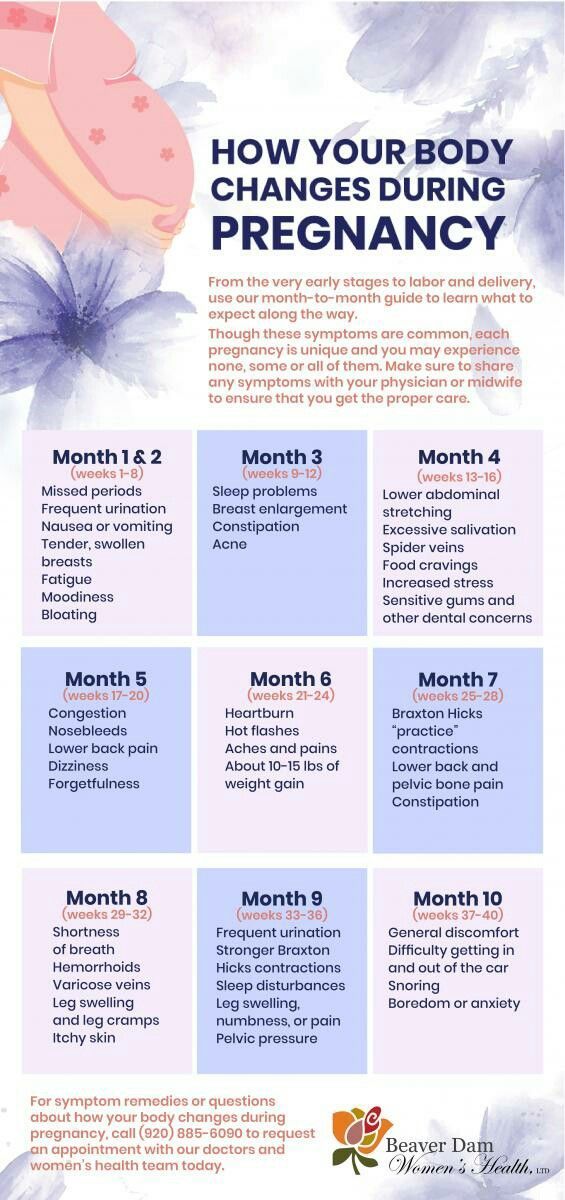
- The activity of the heart is being formed - it is reduced on average at a rate of 140 beats / min. Four chambers have already been formed, and the heart is able to supply blood to other organs.
- The production of red blood cells - erythrocytes begins.
- Active processes are also taking place in the digestive and excretory systems: the first attempts at intestinal peristalsis, the kidneys excrete urine into the amniotic fluid, the liver increases in volume and performs its function of hematopoiesis.
- The respiratory and vascular system is being formed, oxygen is supplied to the organs.
- The skeletal system is in its infancy, still in the form of cartilage, but the base for milk teeth is already appearing in the gums.
- There are as yet no outward signs of sex difference, but ovaries are formed in girls, and testicles in the abdominal cavity in boys.
- The diaphragm separates the abdominal and thoracic cavities. The baby even occasionally hiccups, but very weakly, so the mother does not feel it yet.

The child's skin is transparent and thin, the vascular network is visible through it. On the 11th week, the vocal cords are formed, but the first cry is still very far away...
Mother's well-being and changes in her body
disappear. Sudden mood swings leave the woman, she becomes calmer, more peaceful.
The mammary glands increase in volume, but their sharp sensitivity and pain decrease. The nipples increase in circumference and often change their color to a darker one. Since the woman's body is preparing for breastfeeding with all its potential, a couple of drops of a clear liquid may appear from the nipples, which in no case should be squeezed out.
A woman at this time decides to reconsider her wardrobe, because she is already uncomfortable in her usual tight jeans and tight skirts because of her enlarged uterus. In addition, problems with constipation (constipation) also contribute to an increase in the abdomen. Hemorrhoids are formed due to constipation. But the uterus does not press so hard on the bladder, so the number of daily urination is reduced.
But the uterus does not press so hard on the bladder, so the number of daily urination is reduced.
Important! At the 11th week of pregnancy, abdominal pain is a common occurrence associated with uterine tone, but the pain should be moderate and short-term. Vaginal discharge may also be present, but small, clear, and odorless. Otherwise, consultation and assistance of a gynecologist is a necessary measure.
Nutrition and lifestyle of the future mother
Pregnancy at the 11th week is often accompanied by heartburn. This is due to the fact that the growing fetus compresses the internal organs. Dairy dishes, boiled vegetables and baked fruits will help get rid of discomfort.
Excess weight harms not only the expectant mother, but also the baby. The diet should include foods with a certain content of proteins, carbohydrates, fats. It is better to calculate the calorie content of food according to the table so as not to gain excess kilograms.